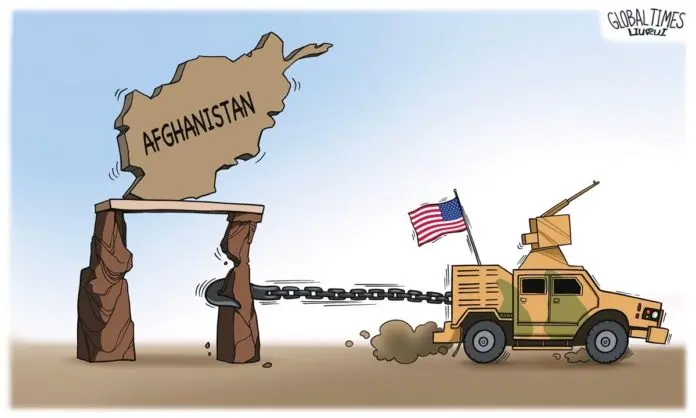- P.O. Box: 11482 Yaoundé, Cameroon; Headquarters: Efoulan, Yaoundé 3
- contact@caessinternational.org

The U.S. military announced on Monday, August 30, 2021, that it had completed its withdrawal from Afghanistan, marking the end of the longest war in U.S. history. The Taliban, returning to power twenty years after being ousted by the Americans, hailed the event as a “historic moment,” while the United States stated that it would “work” with the Islamists if they honor their commitments.
This sudden departure of U.S. troops raises questions today, given that the primary goal of the American presence was to reshape a country that, according to the U.S. administration, had become a rear base for the “forces of evil” protected by the Taliban regime in power in Afghanistan. So, does this withdrawal signal the completion of a perfectly accomplished mission, or is it an admission of failure?
Indeed, heavily criticized from all sides—including by his predecessor Donald Trump—for this abrupt troop withdrawal, U.S. President Joe Biden asserted at the time that “it was time to end this war,” calling his decision “good,” “wise,” and “better” for America.
However, months later, voices—particularly those of senior U.S. military officials—have risen, viewing this decision as a strategic failure. In this regard, on September 28, the Pentagon admitted to “errors in judgment.” The Chairman of the Joint Chiefs of Staff, General Mark Milley, stated, “This is a strategic failure. The enemy is in power in Kabul. There is no other way to describe it.” He reminded that the Taliban “were and remain a terrorist organization and have still not severed their ties with Al-Qaeda,” the group that launched the September 11 attacks from Afghanistan, which triggered the 2001 war.
From this, one can affirm—contrary to President Biden’s statements—that this withdrawal is more of a strategic failure: a failure to export the Western model of democracy and a failure to export the “American way of life,” which appears to have been rejected by the majority of the Afghan people, whose sense of community security now seems to rest more with the Taliban, once again masters of Kabul.